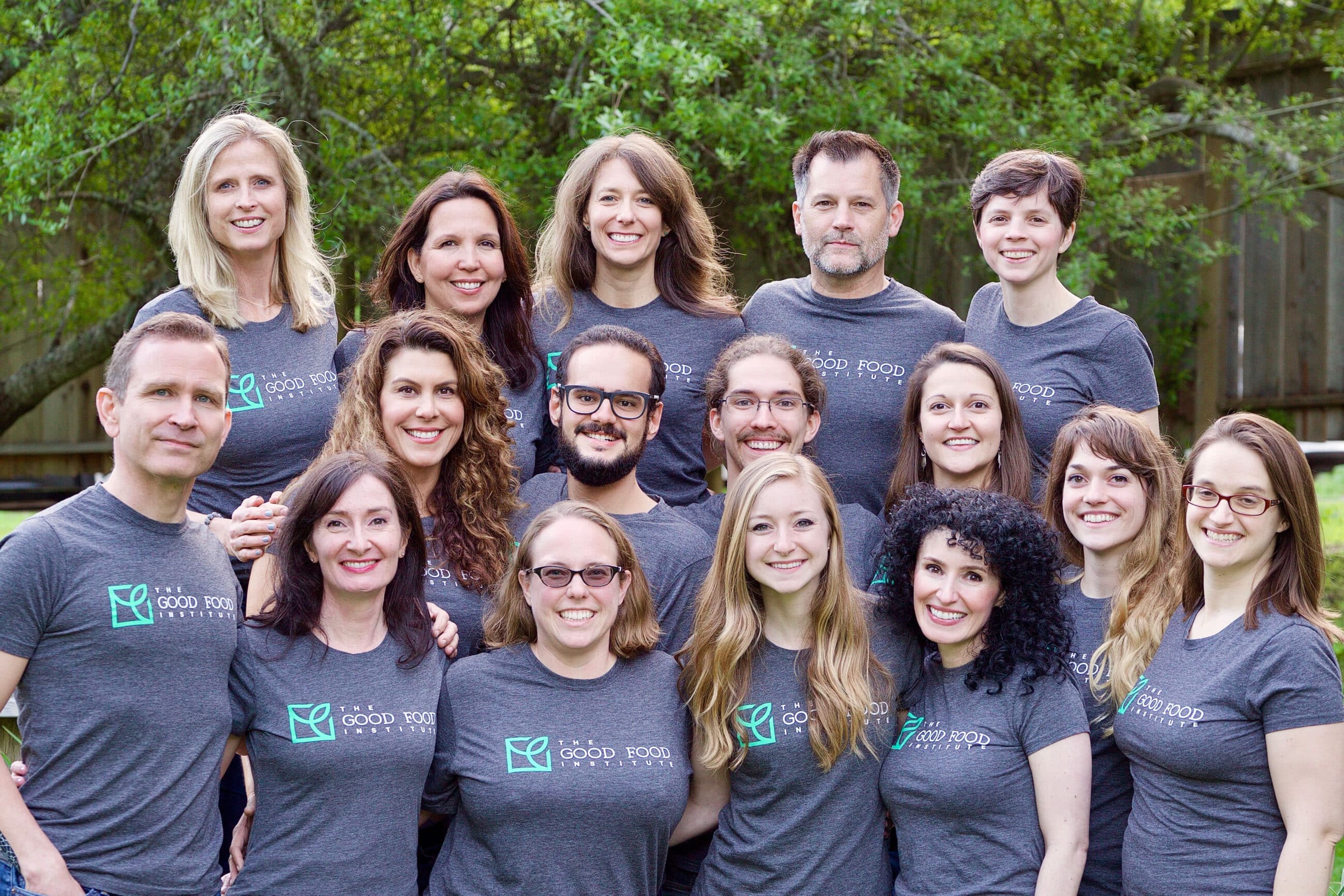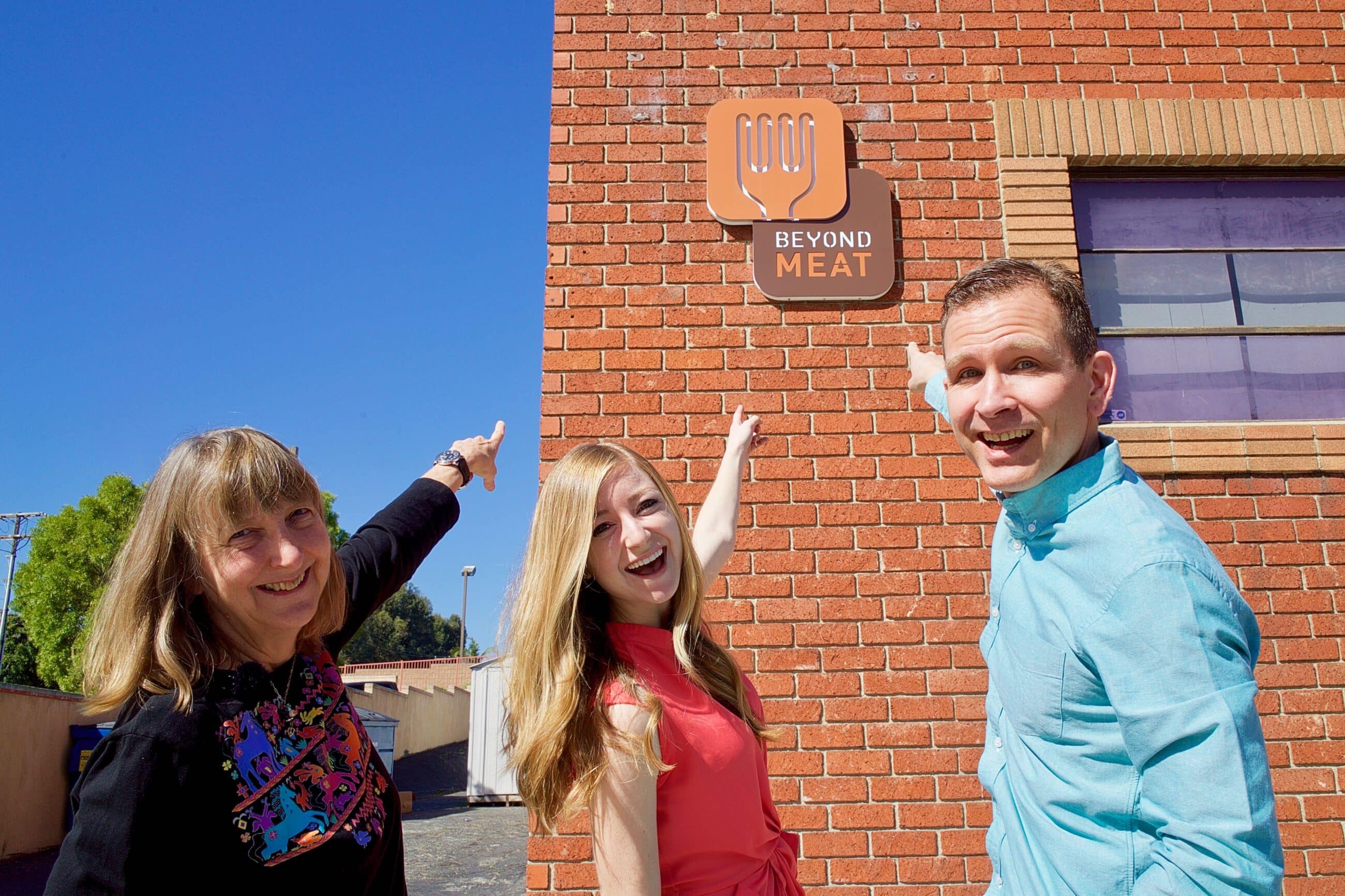Over the last four years, Dr. Bronner’s has donated more than one million dollars – and growing! – to organizations that are working to end animal suffering and exploitation and create a more sustainable food system.
Longtime animal advocate and diligent organizer Bruce Friedrich has been an enthusiastic supporter, wise advisor, and inspiration of Dr. Bronner’s and our team in our efforts to support the animal rights movement. Dr. Bronner’s was an early donor to Bruce’s new project, The Good Food Institute – launched last year. The Good Food Institute is an innovative organization, whose mission is to create a healthy, humane, and sustainable food supply. This new nonprofit, entirely supported by gifts and grants, is partnering with scientists, investors, and entrepreneurs to create cleaner and safer food products thereby making factory farming obsolete.
In 2016, we donated $100,000 to support their launch. We are proud to continue to support their work again this year with another donation of $100,000. I asked Bruce some questions to gain insight on his ambitions for The Good Food Institute and their mission to transform the food system as we know it. Here’s what he had to say.
Q: Let’s start with your background, when and how did you become an advocate for animals? Tell us a little about your background, and the work you’ve done prior to your latest effort, The Good Food Institute.
I adopted a vegan diet in 1987, so I am coming up on my 30-year veganniversary in August. Actually though, I adopted a vegan diet for environmental and human rights reasons after I read Diet for a Small Planet. Basically, the inefficiency of cycling crops through animals to feed humans turned me vegan. In the early 1990s, I read Christianity and the Rights of Animals by Andrew Linzey, and that turned me into an animal rights activist. From 1996 to 2011, I worked at PETA, most recently as vice president for campaigns. From 2011 to 2015, I worked as director of policy for Farm Sanctuary. I started working on GFI in October 2015, and we launched officially on February 1, 2016.
Q: You haven’t only worked to advance animal rights. What other movements have you been involved in. Why is intersectionality – or in other words, an “all-one” approach – crucial to any efforts for progressive change?
From 1990 to 1996, I ran a Catholic Worker homeless shelter in inner city Washington, DC—the Dorothy Day Catholic Worker. I also spent two years teaching in inner city Baltimore through Teach for America, and I was teacher of the year for my school the second year. Since high school, I have been an activist on behalf of peace, LGBTQ rights, and global hunger relief. In college, I helped to run groups focused on global and domestic hunger and anti-war campaigns. I think my first marches were for LGBTQ rights in the mid-1980s in Oklahoma; in the mid-80s in Oklahoma, that wasn’t an especially popular cause. Anyway, for me, I think that progressive values are summed up in a few quotes that have been formative for me:
- “While there is a lower class, I am in it, and while there is a criminal element I am of it, and while there is a soul in prison, I am not free.” –Eugene Debs
- “We must take sides. Neutrality helps the oppressor, never the victim. Silence encourages the tormentor, never the tormented.” –Elie Wiesel
Of course, unlike Debs and Wiesel, I extend my compassion and quest for justice beyond my own species. To be truly progressive, I see these concepts as having to encompass race, nationality, religion, gender identification, and species.
Q: What have vegetarians, vegans, and other specifically anti-factory farming advocates achieved in the last three to four decades? What advancements have we seen in popular culture in favor of animal rights?
Perhaps the biggest change is the complete shift in the playing field; that is, 15 years ago, farm animals were not seen by society as having interests that matter. Now, many of the largest corporations in the world have agreed to make decisions that eliminate some of the worst abuses—from intensive confinement to the grotesque breeding regimes that are accepted practices within industrialized animal agriculture globally. I am convinced that we are moving toward a world in which cruelty to animals will be seen as not morally different from cruelty to human beings. Progress is slower than I would like, but when you look at Gallup polling, you find that most people want to see animals treated well. It’s really only a matter of time before our morality and our laws catch up with basic science, which tells us that other animals are more like us than they are unlike us.
Q: What is The Good Food Institute? What’s your overall mission? What areas of the food system are you working in? What change have you seen thus far?
Studies consistently show that the primary factors in any consumer’s eating choices are taste, price, and convenience. In order to compete with animal products based on the factors that actually guide consumer choice, The Good Food Institute is focused on working to make plant-based and clean meat, dairy, and eggs as delicious, price-competitive, and convenient as possible. We are taking ethics off the table for consumers by making the sustainable and humane choice the default choice. We are very excited by the changes in attitude across the plant-based meat market sector; the trendsetters were Impossible Foods and Beyond Meat, but the attitude that those two companies—“we are making meat to compete with animal-based meat”—has now infected the entire plant-based meat ecosystem, and it’s awesome to see. I’m convinced that once it is easier for people to make choices that align with their basic values–compassion, justice, mercy–we’ll see an even greater shift in consciousness around farm animal protection.

Q: What do you think is The Good Food Institute’s biggest asset and your biggest obstacle toward changing the food system?
Our biggest assets are:
- 1) our many friends who believe in us, including of course, Dr. Bronner’s; because of your faith in our capacity to make a difference, we now have 15 full-time staff and expect to be a team of almost 40 by the end of 2017, assuming we can meet our fundraising goals and find the perfect people for all our open roles.
- 2) our staff. We have been incredibly gratified by the quality of the people who want to work with us to radically transform the food system. As you know, Ryan, every member of the GFI team is a rock star, and everyone could be doing a wide range of other jobs, all more lucrative than working for GFI. Readers can check out our growing team of superstars at gfi.org/our-team.
Our biggest obstacle is probably getting the price points for clean meat and plant based meat down; that is going to take concentrated attention on the science and innovation of both technologies. I’m confident that we’ll get there, but it is going to take time, significant resources (philanthropic, of course, but also academic research and private sector), and the brightest scientists and entrepreneurs to get us there.
Q: Please tell us about The Good Food Institute’s partnership with Dr. Bronner’s? What do you appreciate most about Dr. Bronner’s? How specifically have you benefited from our support?
It’s incredible how smart Dr. Bronner’s is with its advocacy work. Your team is attacking the myriad problems of our broken system holistically, and we value your moral and strategic partnership as much as we value your philanthropic support. I have been an advocate of a whole foods plant-based diet for decades, so it feels slightly compromised to be so focused on food technology, including a food technology that creates real meat but in a different way; having you and the Dr. Bronner’s team helping us to think strategically about how we can accomplish maximum good without compromising our principles has been hugely useful to us. As just one example, David’s “Regenetarians Unite” essay has been invaluable to GFI’s thinking on food issues more broadly.
At a more basic level, Dr. Bronner’s has been a huge part of our success so far. You guys gave GFI the philanthropic support we needed out of the gate, while we were still proving concept and before we’d even officially launched the organization. As a brand-new nonprofit, this gave us the momentum and the confidence we needed to make some key staffing additions and to accelerate. We are deeply grateful to everyone at Dr. Bronner’s for both strategic guidance and your philanthropic vote of confidence.

Q: What do you suggest is the most effective way for people to 1) support GFI and 2) to more generally affect positive change in the food system?
First, there are myriad ways to effect positive change in the food system, from adopting a vegan diet (but don’t stop there–see David’s “Regenetarians Unite” Blog!) to signing up for action alerts from groups that are focused on fighting industrial animal farming, such as Mercy For Animals, The Humane League, and The Humane Society of the United States.
Second, please consider joining our team. We have quite a few openings, which you can check out at: www.gfi.org/jobs. Please scan the openings and let friends and family know about them, too!
Finally, GFI is a 501(c)(3) nonprofit, supporting exclusively through donations. Short of coming to work for us, the best way to support GFI is by helping us to meet our 2017 fundraising goal of $4.66 million, which will enable us to expand to 40 staff by year’s end. Gifts can be securely made online here.
Our pledge to donors is that we will spend all money with a focus on maximum possible effectiveness and efficiency, and readers can get a sense of how we think about that by checking out our 2016 Annual Review, which tells you what we did in our first 11 months. We were deeply gratified last year when the effective altruism movement’s animal-focused wing, Animal Charity Evaluators conducted a deep dive into our plans, work to date, leadership, and so on, and determined that GFI is one of the three best philanthropic investments in animal protection—you can see their benchmarks and review here. Also, if you would like to see our strategic plan or receive our monthly highlights email, please shoot me an email (brucef@gfi.org).